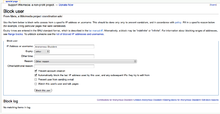Administrator: Difference between revisions
wheel wars |
m added implicit clarifications |
||
| Line 17: | Line 17: | ||
All "administrative" actions are logged and reversible by any other administrator. The same principle applies to all the special permissions on MediaWiki, although some are not publicly logged: see for instance [[check user]]s, who need to be at least a couple on each [[Wikimedia project]] to check each other. |
All "administrative" actions are logged and reversible by any other administrator. The same principle applies to all the special permissions on MediaWiki, although some are not publicly logged: see for instance [[check user]]s, who need to be at least a couple on each [[Wikimedia project]] to check each other. |
||
This makes their activity highly scrutinized by the community. In particular, it's comparable to the ''[[w:en:Ius intercessionis|ius intercessionis]]'' or the [[w:en:Roman consul|Roman consuls]]' veto: an inthrinsic system for consensual action, reciprocal control and prevention of abuse. Its degeneration, when the system fails to actually prevent abuse and such powers |
This makes their activity highly scrutinized by the community at large. In particular, it's comparable to the ''[[w:en:Ius intercessionis|ius intercessionis]]'' or the [[w:en:Roman consul|Roman consuls]]' veto: an inthrinsic system for consensual action, reciprocal control and prevention of abuse. Its degeneration, when the system fails to actually prevent abuse and such powers have to be in fact exercised (multiple times) to reverse a previous action, is the so called ''[[w:en:wheel war|wheel war]]''. |
||
==See also== |
==See also== |
||
Revision as of 11:20, 21 April 2012



Administrators (also known as sysops) are users with the technical ability to:
- delete and undelete pages, and view deleted revisions of pages;
- block and unblock users, individual IP addresses, and ranges of IP addresses;
- protect and unprotect pages, and edit protected pages;
- edit the interface (MediaWiki namespace) and user configuration files;
- import pages from other Wikipedias;
- perform other functions related to the technical maintenance;
- add and remove users from some usergroups like rollback, IP block exempt or flooder.
They can only perform these actions on the wiki that they have been given adminship.
The role and expectations of administrators, as well as the policies surrounding their behavior, vary widely among the different projects. While administrators have more technical abilities than ordinary users, this should not be confused with authority, which is earned separately and given by the community. Some wiki sites may not even have adopted written policies for administrators or candidates for adminship. This is usually due to limited number of users and activities.
All "administrative" actions are logged and reversible by any other administrator. The same principle applies to all the special permissions on MediaWiki, although some are not publicly logged: see for instance check users, who need to be at least a couple on each Wikimedia project to check each other. This makes their activity highly scrutinized by the community at large. In particular, it's comparable to the ius intercessionis or the Roman consuls' veto: an inthrinsic system for consensual action, reciprocal control and prevention of abuse. Its degeneration, when the system fails to actually prevent abuse and such powers have to be in fact exercised (multiple times) to reverse a previous action, is the so called wheel war.
See also
- Administrators of Wikimedia projects
- Meta:Administrators - Administrators on Meta
- Help:Administration - for information about the designation "Administrator" within the MediaWiki software, for users of MediaWiki projects which are not part of the Wikimedia Foundation
